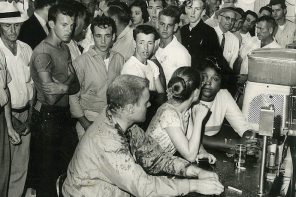President Obama recently received this letter from one of the millions of Americans afraid of health care reform: “I don’t want government-run health care. I don’t want you meddling in the private marketplace. And keep your hands off my Medicare.”
I heard something just as illogical from another shrill conservative, at a local coffee shop meeting with my Congresswoman. “My mother went bankrupt because she couldn’t afford to pay her medical bills,” the conservative said, with understandable tears in her eyes. “But you want the government to pay medical bills for some stranger I don’t even know? Let’s stop this health care reform thing now!”
Across the country, right-wingers are mobilizing with unexpected vitriol to stop a reform that would bring obvious benefits to the vast majority of conservatives themselves, and their loved ones.
There is nothing new about conservatives on the march in the service of self-defeating causes. They have long opposed measures that would give them cleaner air to breathe, water to drink, and food to eat. They have long supported measures that would keep them dependent on foreign oil. They have long cheered for wars that send their sons and daughters off to kill and be killed, and they’ve supported a host of national security policies that make their nation less secure.
No, there is nothing surprising about conservatives trying desperately to defeat health care reforms that could make them healthier and ease their financial burden in many ways.
What is surprising, though, is the rationale that so many conservative intellectuals provide to legitimate the political crusades of their masses. People are naturally selfish, they argue. Everyone wants to “rationally maximize self-interest.” When the conservative masses cry out for measures that are obviously not in their rational self-interest, and against measures that would benefit them, these intellectuals seem to be mysteriously AWOL.
Conservatives might do better to return to their intellectual roots in Christian theology and assert that everyone wants to irrationally maximize selfish interests. Reinhold Niebuhr called it self-aggrandizement. As he made clear, the wellspring of this whole line of thinking is the old doctrine of original sin; which Christian thinkers have evoked for centuries to explain why people refuse to maximize their rational self-interest.
Nowadays many conservative intellectuals try to avoid the no-longer-fashionable notion of original sin by cloaking it in the notion of rational self-interest—which often (as in the case of health care) has little explanatory power. So it falls to intellectuals of more liberal persuasion to try to put together the pieces of this irrational puzzle.
Curiously, many liberal and even left-leaning thinkers end up relying, more or less, on the old Christian idea of irrational self-aggrandizement: People generally don’t like to lose power, they argue, and they’ll struggle hard to stay in power.
Douglas Harrison, for example, has suggested that the anti-health reform mania is really about a loss of cultural dominance: “A multiethnic, politically progressive, increasingly urban, pluralistic, and humanist generation of leaders embodied in Barack Obama is overtaking the once-dominant position so long occupied by Americans of Anglo-European descent and committed to a conservative Christian worldview.”
Theories that make the drive for power a central concern are fashionable in liberal academic circles, where the European philosophers Nietzsche and Foucault still rule from the grave. And they are fashionable outside the academy in left-wing circles, where many activists see themselves pitted in a long-term, life-or-death struggle against the forces of Reagan-Bush-Cheneyism.
Such explanations from the left, like Harrison’s, surely have some measure of truth. But since they are surprisingly akin to the “original sin” tradition that lies at the root of conservatism, they hardly seem like a solid basis for liberal intellectual explanation.
That’s one reason I would put Harrison’s view in a larger context. He assumes, correctly, that we should not view political discourse as the kind of rational discussion and debate the founding fathers may have had in mind. But political discourse is not merely a weapon to gain power, either. It’s most fruitful to see political talk, and much political action, as a way of creating and reinforcing dramatic narratives (some would call them myths).
When I applied this hypothesis to the Bush administration’s “War on Terror,” I found lots of evidence that this concept is a gripping story because it is built on a relatively simple, age-old story: a moral drama of absolute good versus absolute evil. There are lots of theories about why this narrative structure has been, and remains, so popular in so many parts of the world; and why conservatives are generally its most faithful adherents.
Evidence gathered from psychological studies of conservatives supports one set of theories in particular. Conservatives have a notable fear of situations where structure seems absent, uncertain, or ambiguous. This leads them to resist change, which always means an uncertain future. They try their hardest to cling to the existing structures, especially hierarchical structures where some people can be rated as “better” and others as “worse.”
If those studies are accurate, it makes perfect sense that conservatives would insist on, and even enjoy, narratives that turn political life into a struggle of good guys against bad guys. By believing in those stories as the God’s honest truth, by telling them over and over, and by acting them out again and again, they reinforce their belief in a structure that will keep them safe.
On this view, what makes conservatives feel powerful is not just being in charge. No doubt the desire for dominance is a piece of it. But a larger piece is the security they feel when they are in charge: being able to rest assured that the moral order they believe in is in charge, that it’s powerful enough to withstand all challenges. They want dominance not for its own sake but because, when their narrative dominates, it is much easier for them to believe in an objective, universal, eternally valid moral structure. And when their narrative does not dominate, they can preserve their belief in it by acting it out in a war against evildoers.
An enemy is the lifeblood of conservatism. How can you have a gripping moral narrative without an evil enemy to overcome? Any enemy will do, as recent US history shows. Conservatism flourished through most of the Cold War era. When it faltered briefly in the 1960s, the Vietnam-era peace movement came along to revivify conservatism; providing a satisfying domestic enemy to accompany the communist “evil empire” abroad.
After the end of the Cold War, and a bit of uncertainty about who the enemy might be, the philandering ways of Bill Clinton solved the problem (and got the Democratic president impeached in the process). On September 11, 2001, Clinton’s evil ways were pretty much forgotten in a flash, as a more satisfying enemy took his place.
It’s easy enough to understand how the 9/11 attackers could be cast as the evildoers. But why are they now so readily replaced by advocates of health care reform, a seemingly benign issue? Health care reform embodies a perfect storm, whose several factors converge to lead the right down its irrational, self-destructive path of resistance.
First there is the simple uncertainty of change. Even the millions of conservatives who have suffered at the hand of the private health insurance system would generally prefer the devil they know to the purported devil they don’t know.
Then (speaking of the devil) there is the American cultural tradition, dating back to colonial days, that sees people in power as either actual or potential devils. Why are these particular government officials in power? Because they want so badly to be in power, the argument goes. And if they want power that badly, they’ll never be satisfied. Like the devil, they will always grasp for more, always go on irrationally maximizing selfish interest.
The fear of government is exacerbated by the individual now at the pinnacle of power. The office of POTUS once served most white Americans as a reliable symbol of familiar hierarchical structure. Is it just an accident that he lives in the “White House”? But now that house is occupied by the world’s leading symbol of racial, cultural, and political ambiguity. His motives often seem as mixed as his racial heritage.
The seemingly nonsensical quest to find Obama’s “true” birthplace outside the US makes perfect sense in this context: It’s a narrative that casts him as the ultimate enemy of structure and certainty.
The word “sin” doesn’t always appear in the conservative narrative. But the concept and the cultural tradition that the word denotes are always there, uniting the fear of insatiable desire for power with the danger of ambiguity and uncertainty. In a nation where sin has traditionally been imputed to both government and the darker races, it is all too easy to whip up that sense of fear and danger around an image of government led by a black man.
Finally, health care raises right-wing hackles because it is about the relationship between the political state and the state of our physical bodies. Conservatives are always prone to ambivalence about the body, which offers such tempting pleasures and therefore, like liberty, requires eternal vigilance. With conservatives so prone to seeing government as an agent of sin, any talk of government laying hands on their bodies can easily raise fears that government will contaminate those bodies with its sin. And when death—the wages of sin—seems to be stalking the land, then (as Louis Ruprecht points out) the frenzy over health care will grow all the more.
But even death can be relatively tolerable to conservatives if it seems to make sense; if it can be interpreted within structures that seem familiar, dependable, and secure. What conservatives fear most, as the research shows, is precisely the uncertainty and ambiguity of structure. And that fear, above all, is now blocking the path to health care reform.
How can health reform advocates overcome such fear? Here lies the most painful paradox of all. The crucial swing voters are now (as they’ve been for so long) the millions who are economically insecure, struggling to make ends meet. As the president never tires of repeating, health care reform is a key to bringing these millions out of their economic insecurity. Yet many of them cannot see it that way, because they seek security not through economic change but through highly structured social, cultural, and religious narratives—narratives that lead them to oppose the very reforms from which they could benefit most.
The liberals’ faith is that, if they can win reform despite the conservative outcry, the resulting economic gains will eventually take the wind out of conservative sails. If liberals can drag economically strapped conservatives, kicking and screaming, toward greater prosperity, perhaps the kicking and screaming will die down.
But there are wealthy conservatives too. Their kicking and screaming against health care reform may come in part from fearing a loss of profit and wealth. But it also comes in part from the need all conservatives share for a moral drama and an enemy to fight against.
We cannot know how far prosperity would go toward defusing conservative angst and anger. That’s not a particularly good reason for supporting a program of affordable, high-quality health care for all Americans, anyway. But the health care debate, with all its sound and fury, gives us a good opportunity to understand more deeply the cultural stresses and strains that we have lived with, and are likely to go on living with, for a long time.




